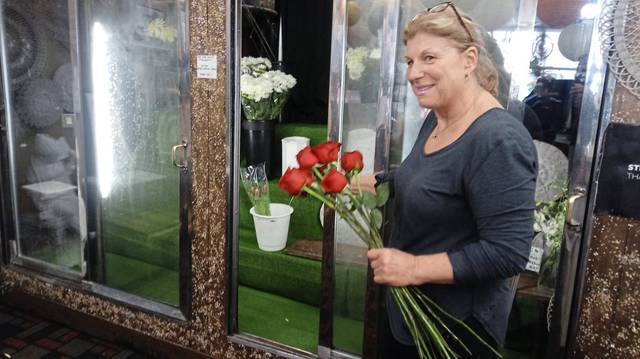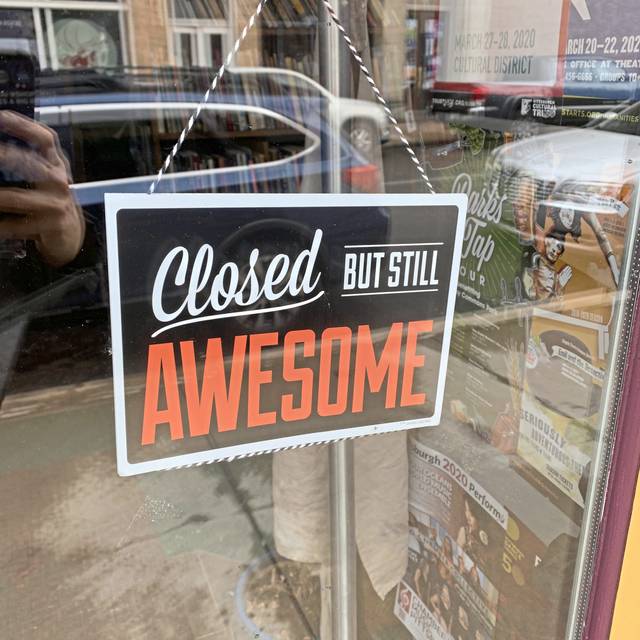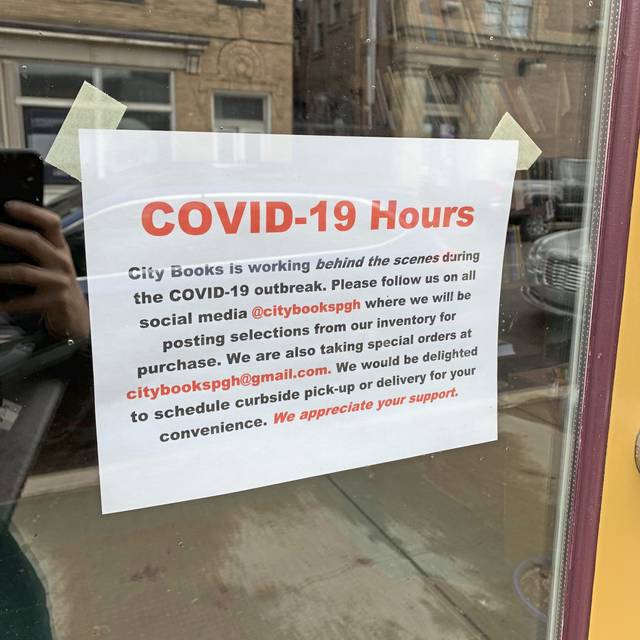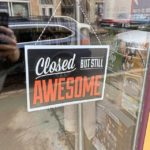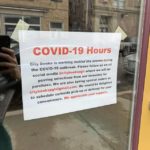A day after Gov. Tom Wolf imposed an order on all but “non-life-sustaining” businesses to close to thwart the spread of covid-19, local business owners across Western Pennsylvania are scrambling to gauge how the state’s unprecedented shutdown will impact them and navigating how to survive it.
Wolf announced Friday night that the enforcement of closures will be delayed until 8 a.m. Monday.
Many owners already have laid off workers for fear of not being able to meet payroll.
Some still aren’t sure whether they’re OK to continue operating, such as a home repair service or landscaping company.
“At a minimum, the lawns need mowed. A lot of my customers are elderly and can’t do it themselves,” said Tim Habazin, president of Northern Scapes, a three-employee company based in Pleasant Hills that serves more than 100 residential customers and 10 commercial sites. “If the lawns get too high, it’ll open the door for animals and insects, which can carry other diseases — lyme, for example.
“Not to mention if people are quarantined to their homes, a neglected yard won’t help with their psyche. I see lawn maintenance as being essential.”
Habazin joined thousands of business owners statewide who made frantic calls and sent urgent emails Friday to local and state and public officials hoping to get more clarity.
Wolf acknowledged that his Thursday night order closing all non-life-sustaining businesses will hurt those businesses and impact the economy.
The main priority, he said, is keeping residents safe and making sure the state’s hospitals aren’t broken by an influx of covid-19 patients.
“I understand your concerns,” Wolf said Friday afternoon during a news conference. “I was a business owner most of my adult life. These are uncharted waters. In this situation, we are not going to do everything perfectly, but we’re going to do the best we can to keep our hospital system from crashing.”
The governor urged businesses who are listed as non-life-sustaining but believe otherwise to make use of the “robust waiver system” now in place.
“Once this is over, everyone in Pennsylvania is going to need help,” Wolf said. The state will need the federal government to pass a stimulus package but “we’re also going to need to do some things on our own right here in Pennsylvania.”
Wolf said he has plans for a $60 million low-interest loan program meant to lighten the burden of businesses in the state. He also reiterated that business owners are eligible for federal small business loans.
“We’re in an unprecedented crisis, and we need to use every tool at our disposal,” Wolf said.
Business advocates brace for unknown
Westmoreland County has more than 30,000 small businesses, which is defined as any company with 500 or fewer employees, said James Kunkle, executive director of the Small Business Development Center at Saint Vincent College.
The impact of the closure order is “devastating,” Kunkle said.
“Once they shut down the bars and restaurants, it was sort of inevitable that would extend to other economic sectors,” he said. “The real question is going to be how long it’s going to last. Two weeks? We hope that’s all it is.”
How long a business can hold out will vary, including by their amount of cash on hand and fixed costs.
“I have clients that could hang on for months. I have others that two weeks of no cash flow could mean they have to close their doors,” he said. “It depends on your industry. It depends on your cash flow cycle. It depends on how well capitalized you are.”
Kunkle said he would advise business owners to “stay the course” and avail themselves of assistance, which he said is already out there with more to come.
The Alle Kiski Strong Chamber has about 500 members across four counties.
“The unknown and uncertainty of this serious situation is hard,” said the chamber’s executive director, Lynda Pozzuto, “but we will all get through this with the continued support of our government, area businesses and organizations and the community.”
Business owners’ concerns
Kalmar Chevrolet in Gilpin is allowed to sell parts and service cars, but can’t sell any vehicles, new or used, Len Kalmar said.
“If you come in today to buy a car, we can’t sell you a car,” he said.
Kalmar said he’s not sure why car dealers aren’t allowed to operate during the closure, since people need transportation. He said that car sales are a major contributor to tax revenue.
“I don’t see the need for car dealers to close. That doesn’t make any sense. We don’t have that close contact,” he said. “I don’t know where the governor came up with his list.
“We’re in uncharted waters right now.”
Kalmar predicted: “Once we get past this and everything opens up again, you’re going to have tremendous demand for stuff and the economy will pick up really fast. There’s a lot who will dig themselves a hole, too.”
Omni Electric in New Kensington shut down its commercial work, and is continuing residential work only in emergencies, said Brian Brestensky, the company’s superintendent.
Omni shut down at noon Friday; Brestensky said he was there to clean things up before closing.
“This is unprecedented. You’re not used to something like this,” he said. “It’s weird. The phones are dead.”
Brestensky said he thinks Omni, which has 17 employees, will survive.
“We’ll be OK,” he said. “In a weird way, we’re not spending money, and money’s not coming in. So guys can collect unemployment.”
Shawn Maust, owner of Maust Lawncare and Landscaping in Pittsburgh’s Sheraden neighborhood, said he wasn’t sure Friday whether he could have crews out in the field. He told his five workers to stay home.
“It won’t bother me if this would only be for another week, but the guys who work for me, they need the income,” he said. “They really didn’t want to take off today.”
He said he’s called state and local government offices, but hadn’t heard back as of Friday afternoon.
“The (state’s) message is a little vague. It comes across like they’re closing storefronts or offices where people congregate. But I work out in the field so I didn’t know if I could stay open or not,” he said. “Nobody’s been able to give me an answer.”
As he closed his shop Friday, Mario Gigliotti, 73, said he has never faced anything like this in the 42 years he’s owned Squirrel Hill Shoe Repair on Murray Avenue in Pittsburgh’s Squirrel Hill neighborhood.
“I’m hoping it’s only for a week or two,” he said. “Anything beyond that and it’s going to be rough.”
Even before the governor ordered the shutdown, the covid-19 scare already had slowed the usually steady stream of customers bringing shoes into his shop for repairs.
“Usually this time of year we get bombarded with shoes. I have to work 12 hours a day,” he said. “But everybody’s afraid and nobody’s coming out.”
Gigliotti said he understands why the shutdown is happening. He was born in Italy and came to the U.S. when he was 13. He still has cousins who live in Italy and are dealing with that country’s nationwide quarantine.
“It’s bad there,” he said. “My one cousin lives near Venice where he owns a trucking company. He said, ‘What am I going to move? Everything is closed.’”
Among Gigliotti’s concerns is his son, Mario Jr., his only other employee.
“He has a mortgage and kids,” Gigliotti said. “He still depends on making money here.”
Ronna Wedner-Levine began to cry as he started to talk about shutting down the family-owned Squirrel Hill Flower Shop across from the Manor Theater.
“We’ve never been closed for more than a day. We’re only closed for Christmas Day and New Year’s Day, that’s it,” said Wedner-Levine in the shop on Friday. She stood near a nearly empty refrigerated case that typically is brimming with colorful bouquets and floral arrangements.
“I’ve never seen it so empty,” she said. “It’s just sad and the thought of having to get all of the flowers out of here makes it worse.”
It was around lunchtime and she and her daughter Katie, who also works at the store, were preparing to close up shop by 3 p.m.
“People order flowers to make themselves happy and to make other people happy. So, it’s hard not to be able to do that,” Katie Levine said. “Like today, we’re sending flowers out to people with cards that say ‘I Love You.’ Flowers brighten each day.”
Wedner-Levine said she has to lay off two drivers and one floral designer. She worries about whether the store can survive with all of the business it is losing from the cancellation of weddings, proms and college graduations.
“What’s going to happen when we come back? Mother’s Day is a big question,” she said. “If everything goes right, I will be here to deliver for Mother’s Day. They’re not gonna stop me. I’m telling you right now.”
Bill Vlakancic, who operates North Side Auto on Spring Garden Avenue in Pittsburgh with his brother, Joe, said business had been booming for the past few months, but dropped off suddenly Friday morning following Gov. Wolf’s order.
“We have some work scheduled, but our phone’s not ringing,” Vlakancic said. “It’s day-to-day around here. We’ve usually got some walk-ins, but not today. Nobody’s coming out.”
Vlakancic and his brother are the only employees in the shop. They plan to remain open for emergency repairs until told otherwise.
Arlan Hess, owner of City Books in Pittsburgh’s North Side, said she’s closed the shop and suspended online sales. But she’s also expanding other content, including her author interview show “Shelf Life” co-produced by PCTV 21.
“I have been reading a poem a day and posting those to our Twitter and Facebook accounts,” she said. “Beginning this weekend, I will be posting a short story link to social media, and if people are interested in participating, they can email me and I will send them a link to a Zoom chat.”
She said she plans to start offering gift certificates in coming weeks and is working with vendors to offer a “covid care package” by mail, which would include a blind date with a book, two candle tins and two teabags from Hecatea & Me.
Hess closed the store last Sunday to focus on online sales and had planned to offer curbside pickup and delivery as long as possible, but stopped that Thursday.
“Together with libraries, independent bookstores are strong community centers,” she said. “It’s important to me and to Pittsburgh that City Books remains an active source for discussion and exchange — even if it’s in a non-transactional manner for the foreseeable future,” she said.
Jay Lee, 62, moved to the U.S. from his native Seoul, South Korea, 33 years ago and is now part-owner of Footers Dry Cleaners on Forbes Avenue in Squirrel Hill. As bad as he feels about having to close his business, he says he feels even worse for his customers.
“Please tell my customers I love them and I’m very sorry,” Lee said Friday as heavy rain poured down outside.
“I’m very, very worried,” said Lee. “How am I going to pay my rent? How am I going to pay my utilities? I’m very worried about it.”
Lee said he hopes to retain his employees during the shutdown but is not sure if he can.
“I have no money to pay them,” he said.
Joe White, owner of Robinson-based Carl Walker Construction, said the company has ongoing projects in Pennsylvania, New York, Kentucky and West Virginia.
Work is continuing in Kentucky and West Virginia, but he’s been ordered to shut down jobs in Pennsylvania and New York.
The company specializes in building and maintaining parking garages and precast concrete structures like bridges. It employs 80 to 90 people.
“Right now it’s the middle of March. The construction season for outdoor work typically starts around April 1,” White said. “There are at least four projects that we would have started in the next four weeks, and all of them called us this morning and said put everything in neutral.”
White said he plans to keep employees working for as long as possible on cleanup and maintenance around the offices and facilities.
“There are certifications that employees have to have, training and things like that,” he said. “We’re reviewing that right now. And if employees can take those classes online, we are going to pay them for doing that.”
White said he disagrees with a complete shutdown.
For example, he said, the company is working on a parking garage at Nemacolin Woodlands Resort. The crew would normally be working around vehicles moving in and out.
“In this instance, nobody’s there anymore,” he said. “It’s almost like a dream come true: We pay a lot of overtime to work on the weekends when nobody’s around. This is the perfect opportunity to do it right.”
In addition, employees receive extensive training in infectious disease control and the company has stringent safety protocols they must follow.
“We’re in isolation as it is, and it’s almost like this is backfiring,” he said. “In a lot of cases you’re doing demolition and cutting and things like that and you don’t want anybody around you.”
Tom Melcher, business manager for the Pittsburgh Regional Building Trades Council, said construction projects across the region and 42,000 workers were at a standstill Friday morning.
The council is a trade coalition representing 19 craft groups such as carpenters, ironworkers, heavy equipment operators and electricians and more than 33 local unions in Western Pennsylvania.
“As of right now, everybody’s shutting down their projects because of the governor’s order,” Melcher said. “It’s going to have a tremendous impact on our trades. We don’t know where we’re going to go from here.”
He said officials are reaching out to Wolf’s office for further guidance.
“As far as the trades are concerned right now, we will go by what the governor says,” Melcher said. “This could change from hour to hour. It’s like a revolving door.”
He said workers would be signing up for unemployment.
“They have no other options,” he said. “The unemployment is going to spike here.”
Here is a revised list of businesses that are required to close and those types that can continue operating.
UPDATED – Industry Operatio… by Governor Tom Wolf on Scribd
Staff writers Natasha Lindstrom, Bob Bauder, Paul Guggenheimer, Brian Rittmeyer and Megan Guza contributed.



